Rew Research Group
March 16, 2006
Summary of Findings
As the third anniversary of the start of the war in Iraq approaches, public
support for keeping U.S. troops in Iraq has reached its lowest point and
assessments of progress there have turned significantly more negative than they
were just a few months ago.
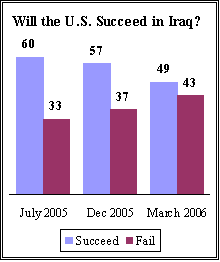 Optimism about the potential
for establishing democracy in Iraq has declined sharply. In several surveys
since last July, consistent majorities of Americans including 57% in
December and 55% as recently as last month had said they believed that
the U.S. will succeed in establishing a stable democratic government in Iraq.
But today fewer than half (49%) say that success is probable.
Optimism about the potential
for establishing democracy in Iraq has declined sharply. In several surveys
since last July, consistent majorities of Americans including 57% in
December and 55% as recently as last month had said they believed that
the U.S. will succeed in establishing a stable democratic government in Iraq.
But today fewer than half (49%) say that success is probable.
The public's more negative view of the situation in Iraq is reflected in the
growing numbers of Americans who believe the U.S. is losing ground, rather than
making progress, on such key objectives as preventing a civil war and defeating
the insurgents. Two-thirds say the U.S. is losing ground in preventing a civil
war in Iraq, up from 48% in January. About half (51%) believe the U.S. is
losing ground in defeating the insurgents militarily, compared with 38% two
months ago. And even in areas where majorities continue to see progress being
achieved such as in training Iraqi forces and rebuilding Iraq's
infrastructure increasing numbers think the U.S. is losing ground.
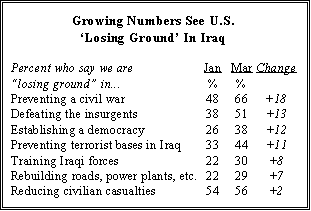 Public perceptions of the
character of the conflict in Iraq are also shifting. Americans increasingly are
coming to perceive the ongoing conflict as having developed into a civil war.
Currently the public is divided between those who see it primarily as a civil
war and those who view it as an anti-U.S. insurgency (42% vs. 45%). As recently
as December, 30% saw it as mostly a civil war.
Public perceptions of the
character of the conflict in Iraq are also shifting. Americans increasingly are
coming to perceive the ongoing conflict as having developed into a civil war.
Currently the public is divided between those who see it primarily as a civil
war and those who view it as an anti-U.S. insurgency (42% vs. 45%). As recently
as December, 30% saw it as mostly a civil war.
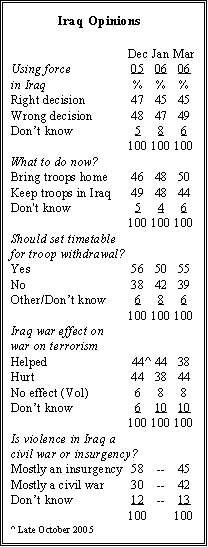 Currently, half of the public
(50%) says that the U.S. should bring its troops home from Iraq as soon as
possible, compared with 44% who say we should stay there until the situation
has stabilized. The number favoring an immediate withdrawal is up only slightly
from January (48%), but represents the highest measure of support for a troop
pullout since the war began.
Currently, half of the public
(50%) says that the U.S. should bring its troops home from Iraq as soon as
possible, compared with 44% who say we should stay there until the situation
has stabilized. The number favoring an immediate withdrawal is up only slightly
from January (48%), but represents the highest measure of support for a troop
pullout since the war began.
In addition, 55% of Americans favor the U.S. establishing a timetable for when
troops should be withdrawn from Iraq, about the same number that expressed that
view in December. And by two-to-one (61%-30%), more say their bigger concern is
that the U.S. will wait too long to withdraw its troops from Iraq as opposed to
leaving too soon before a stable democracy is in place.
A growing number of Americans also believe the war in Iraq has hurt, rather
than helped, the war on terror. More than four-in-ten (44%) think the war has
hurt the war on terrorism, compared with 38% who say it has helped. In January,
44% said the Iraq war helped the broader struggle against terrorism.
However, while support for a troop pullout has inched up, a solid majority
(57%) continues to say that an American withdrawal would strengthen terrorist
organizations operating in Iraq; that compares with 23% who think terrorists
would be unaffected by a U.S. withdrawal, and 9% who say the terrorists in Iraq
would be weaker. Even among those who feel the decision to go to war was wrong,
a plurality (45%) believes that terrorist organizations in Iraq would become
stronger if the U.S. withdraws.
Bush Ratings on Iraq Go Lower
A large majority (70%) of the public now believes that President Bush lacks a clear plan for ending the war successfully, which is the highest number expressing that view in surveys dating to September 2003. Fully 89% of Democrats and 79% of independents believe Bush lacks a clear plan on resolving the conflict, but 40% of Republicans share this opinion.Just 30% of the public approves of the way Bush is handling the situation in Iraq, down eight points since February and a low point for his presidency. The decline mirrors the slide in Bush's overall job approval, from 40% in February to 33% in March.
Huge Partisan Divide in Optimism
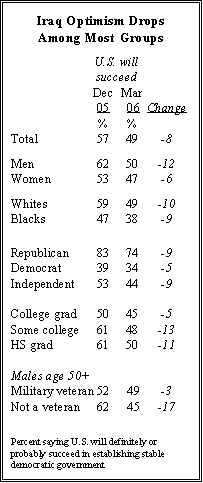 The decline in optimism about
prospects for success in Iraq has come across the demographic spectrum. Men, in
particular, are more dubious that the U.S. can establish a stable democratic
government; 50% say that now, down from 62% in December. Consequently, the
gender gap in these attitudes has nearly disappeared.
The decline in optimism about
prospects for success in Iraq has come across the demographic spectrum. Men, in
particular, are more dubious that the U.S. can establish a stable democratic
government; 50% say that now, down from 62% in December. Consequently, the
gender gap in these attitudes has nearly disappeared.Republicans, Democrats and independents are all less likely to say that the U.S. will definitely or probably succeed in establishing a stable democratic government. But the political divide remains enormous; more than twice as many Republicans as Democrats think the U.S. will succeed in Iraq (74% vs. 34%).
Notably, men ages 50 and older who have not served in the military have become much less confident that the U.S. will succeed in Iraq. Fewer than half (45%) now say the U.S. is likely to achieve its goals, compared with 62% in December. By contrast, opinions among older male veterans have remained stable.
Civil War Worries Grow
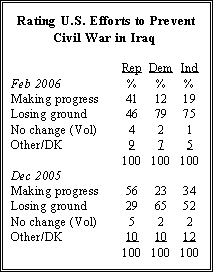 Perceptions of the Iraq war
have shifted over the past few months, with a dramatic increase in the number
seeing the current violence as a civil war rather than an insurgency targeting
U.S. forces. And views of American efforts to forestall a civil war have grown
much more negative, especially among Republicans.
Perceptions of the Iraq war
have shifted over the past few months, with a dramatic increase in the number
seeing the current violence as a civil war rather than an insurgency targeting
U.S. forces. And views of American efforts to forestall a civil war have grown
much more negative, especially among Republicans.In December, Republicans by nearly two-to-one (56%-29%) said we are making progress rather than losing ground in preventing a civil war. But today Republicans are divided; if anything, slightly more say the U.S. is losing ground rather than making progress (by 46%-41%). The shift has been less dramatic, though substantial, among Democrats and independents.
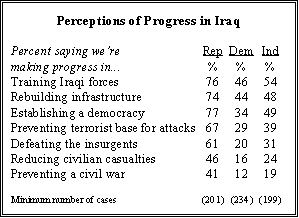 Republicans remain much more
positive about progress toward other goals in Iraq; large majorities believe
the U.S. is making progress toward establishing a democracy (77%), training
Iraqi forces (76%), and rebuilding the nation's infrastructure (74%). Roughly
six-in-ten Republicans (61%) believe the U.S. is making progress in defeating
the insurgents, though that is down from 70% in December.
Republicans remain much more
positive about progress toward other goals in Iraq; large majorities believe
the U.S. is making progress toward establishing a democracy (77%), training
Iraqi forces (76%), and rebuilding the nation's infrastructure (74%). Roughly
six-in-ten Republicans (61%) believe the U.S. is making progress in defeating
the insurgents, though that is down from 70% in December.Democrats generally are far more gloomy. Just a third (34%) see progress in establishing a democracy in Iraq and even fewer (20%) say the U.S. is making progress in defeating the insurgents militarily. The only areas in which there is even modest optimism among Democrats are in views of training the Iraqi military and rebuilding infrastructure; even here, however, fewer than half say the U.S. is achieving progress.
Describing Iraq in a Word
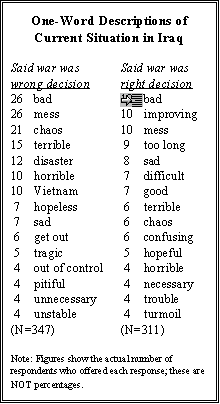 When respondents were asked
to give a one-word impression of the situation in Iraq, the words "mess,"
"bad," "chaos," "terrible," and "disaster" were offered most frequently along
with such variants as "hopeless, "pitiful," "Vietnam," and "out of
control."
When respondents were asked
to give a one-word impression of the situation in Iraq, the words "mess,"
"bad," "chaos," "terrible," and "disaster" were offered most frequently along
with such variants as "hopeless, "pitiful," "Vietnam," and "out of
control."Those who said that the decision to launch military action in Iraq was the right decision were more likely to offer positive or neutral words, among which "improving," "hopeful," and "good" were mentioned most frequently. However, even among people who approved of the decision to invade Iraq, negative attributes outweighed positive ones by two-to-one.
Islam and Democracy in Iraq
The public is divided over whether democracy in Iraq can succeed if people elect Islamic religious leaders to power. A slight plurality (43%) believes democracy cannot succeed in these circumstances, while 37% say it can and a relatively large minority (20%) declined to offer an opinion. Attitudes on this issue have been fairly stable over the past year; in September 2005, 47% felt democracy could not succeed in Iraq if Islamic religious leaders gain power.More See Islam as Violent
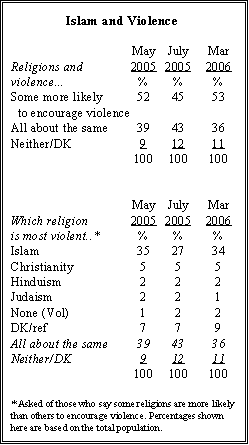 Roughly half of Americans
(53%) believe generally that some religions are more likely than others to
encourage violence among their believers, while 36% say religions are all
pretty much the same in this regard. About a third of the public (34%) points
to Islam as the most violent religion.
Roughly half of Americans
(53%) believe generally that some religions are more likely than others to
encourage violence among their believers, while 36% say religions are all
pretty much the same in this regard. About a third of the public (34%) points
to Islam as the most violent religion.The beliefs that some religions encourage violence and that Islam is most violent have become somewhat more prevalent since last summer. In July 2005, shortly after the terrorist bombings in London, there was a modest decline in the number who regard Islam as a religion that promotes violence. The current measure is nearly identical to one from May of last year.
There is a stark political division in attitudes toward religion and violence. Nearly two-thirds of Republicans (65%) say some religions are more violent than others, while half (51%) cite Islam as the most violent religion. Democrats are split over the question of whether some religions are more likely to encourage violence 44% say yes, while 45% say all religions are pretty much the same. Just a quarter of Democrats see Islam as the most violent religion.
Commentary: